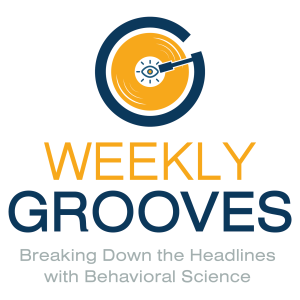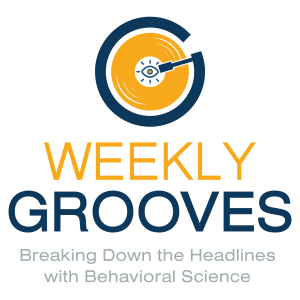
Stories, science and secrets from the world’s brightest thought-leaders. Behavioral Grooves is the podcast that satisfies your curiosity of why we do what we do. Explanations of human behavior that will improve your relationships, your wellbeing, and your organization by helping you find your groove.
Episodes

Wednesday Dec 16, 2020
How to Deal With Anxiety Over COVID Vaccines
Wednesday Dec 16, 2020
Wednesday Dec 16, 2020
Are the new COVID-19 vaccines are safe? It will probably take time to know for sure; however, this week Kurt and Tim discuss the behavioral aspects of the transition. Kurt was engaged by an article in Bloomberg called “Vaccines May Have Social Side Effects,” by Tyler Cowen, a professor of economics at George Mason University.
Professor Cowen raised the idea that the mere presence of vaccines may give people an unwarranted boost in confidence and lead to less mask-wearing and social distancing.
In this 8-and-a-half-minute grooving session, we discuss some of the behavioral aspects of the transition.
© 2020 Behavioral Grooves
Links
“Vaccines May Have social Side Effects”: https://www.startribune.com/vaccines-may-have-social-side-effects/573096121/?refresh=true
How a Covid-19 Vaccine Could End Up Helping the Virus Spread: https://www.bloomberg.com/news/articles/2020-11-11/if-we-re-not-careful-a-vaccine-might-help-covid-19-spread

Sunday Dec 13, 2020
Amy Bucher on Participatory Design, Trust and Engaging Your Audience
Sunday Dec 13, 2020
Sunday Dec 13, 2020
Amy Bucher, PhD is the Vice President of Behavior Change Design at Mad*Pow and the author of “Engaged” a new book on how to apply behavioral science to the design and development of products. At Mad*Pow, she designs motivating interventions to help people live healthier and happier lives and, in her spare time, knocks 150 books off her reading list every year. (OMG!)
Amy was recently recognized as one of 10 behavioral scientists you should know in Forbes magazine. While we did spend a bit of time on the article and her work at Mad*Pow, most of our conversation focused on the book.
We talked about motivation and the incredible power that idiosyncratic messaging can have on customers when used properly by marketing and sales. We also discussed participatory design, trust, and how important it is for product developers and marketers to demonstrate trust.
She also offered her thoughts on how designers need to do a better job of integrating behavioral science into their products. Some are doing it, but there are lots of opportunities for improvement Amy offered some ideas on this.
Lastly, we want to note that Amy wrote that one of the most important reminders for the corporate world: Almost everything a designer makes has behavior change built into it. The smart designers will be thinking about that as they design their products (or enhancements).
We hope you enjoy this conversation with Amy as much as we did and hope that this week, you find your groove.
© 2020 Behavioral Grooves
Links
Amy Bucher, PhD: https://www.linkedin.com/in/amybucher/
“Engaged”: https://amzn.to/3BkG1mb
“Super Better” by Jane McGonigal: https://amzn.to/2YwILOY
“Atomic Habits” by James Clear: https://amzn.to/3ad9Nxn
Forbes Article: “Top Behavioral Scientists You Should Know”: https://www.forbes.com/sites/alineholzwarth/2020/10/29/10-behavioral-scientists-you-should-know/?sh=72ddbe3c42e0
Pattern Health: https://pattern.health/
Ran Kivetz, PhD “Idiosyncratic Fit”: https://www.gsb.stanford.edu/faculty-research/publications/idiosyncratic-fit-heuristic-effort-advantage-determinant-consumer
Peppers & Rogers 1:1 Marketing: https://hbr.org/1999/01/is-your-company-ready-for-one-to-one-marketing
McDonald’s milkshake innovation: https://www.youtube.com/watch?v=Stc0beAxavY
Adam Hansen: https://www.linkedin.com/in/adhansen/
Bent Handle Snow Shovel: https://www.acehardware.com/departments/lawn-and-garden/snow-removal-and-equipment/snow-shovels-and-pushers/7200439
Musical Links
R.E.M. “Losing My Religion”: https://www.youtube.com/watch?v=xwtdhWltSIg
Michael Stipe: https://en.wikipedia.org/wiki/Michael_Stipe
Britney Spears: https://www.youtube.com/watch?v=C-u5WLJ9Yk4
Robyn: https://www.youtube.com/watch?v=CcNo07Xp8aQ
The Doves “There Goes The Fear”: https://www.youtube.com/watch?v=SneuvKIkM3A
Pulp: https://www.youtube.com/watch?v=yuTMWgOduFM
Manchester Orchestra: https://www.youtube.com/watch?v=8ui9umU0C2g
Depeche Mode “Personal Jesus”: https://www.youtube.com/watch?v=u1xrNaTO1bI

Sunday Dec 06, 2020
Evolving HR Using Behavioral Science with Ryan McShane
Sunday Dec 06, 2020
Sunday Dec 06, 2020
Ryan McShane is the President and CEO of HR Evolution, a consultancy that designs systems that support employee alignment to organizational purpose through HR best practices, organizational development initiatives, and professional development solutions.
We discussed a variety of HR related topics including psychological safety, emotional intelligence, and what can be done when it comes to improving the mindset of leaders. Ryan stressed that WIIFM (what’s in it for me) is central to the impetus to change at all levels of the organization.
Plus, he offered a particularly cool insight: Change comes about when the pain of staying the same is higher than doing something different.
We also discussed how the social contract between the employer and the employee has changed dramatically. And we got to hear Ryan’s rationale for being so optimistic about a future where employers need to put forth extra effort to attract and retain the best and brightest workers. It got us thinking: could the growing gig economy actually offer more value to the employees than the employers?
Lastly, we appreciated Ryan’s approach to working through the pandemic and the reminder that intimidation and scare tactics have no place in today’s workplace. Frederick Taylor’s vision of work should be a thing of the past. Period.
We hope you enjoy our conversation with this very bright behavioral science practitioner, and as always, let us know what you think!
© 2020 Behavioral Grooves
Links
Ryan McShane: https://www.linkedin.com/in/ryan-mcshane-743382a/
Ryan’s email: rmcshane@hrevolutionllc.com
HR Evolution: https://hrevolutionllc.com/
Zappos: https://www.zappos.com/
US Census Bureau Pulse Surveys: https://www.census.gov/programs-surveys/household-pulse-survey/data.html
Schumann Resonance: https://en.wikipedia.org/wiki/Schumann_resonances#:~:text=The%20Schumann%20resonances%20(SR)%20are,Earth's%20surface%20and%20the%20ionosphere.
Fredrick Taylor: https://en.wikipedia.org/wiki/Frederick_Winslow_Taylor
Muir Woods: https://www.nps.gov/muwo/index.htm
Musical Links
Jimi Hendrix at Woodstock: https://www.youtube.com/watch?v=0xTHMDrRUKo
Grateful Dead “Ripple”: https://www.youtube.com/watch?v=5yJmBC7cMTM
Nirvana “About a Girl”: https://www.youtube.com/watch?v=_24pJQUj7zg
Radio Head “Hail to the Thief”: https://www.youtube.com/watch?v=8MdwaUtW_D4
Smashing Pumpkins: https://en.wikipedia.org/wiki/The_Smashing_Pumpkins
432 Hertz Music (Musik): https://www.youtube.com/watch?v=dg1_DXazvKI
JS Bach “Brandenburg Concerto No. 3”: https://www.youtube.com/watch?v=pdsyNwUoON0
Linda Diaz “Green Tea Ice Cream”: https://www.youtube.com/watch?v=Ursri8GmlW4
“Sunny Side of the Street”: https://www.youtube.com/watch?v=Nn3soYbSpS4
Fabiano de Nascimento: https://www.npr.org/2020/07/02/885766987/fabiano-do-nascimento-tiny-desk-home-concert
Depeche Mode: http://www.depechemode.com/
Nine Inch Nails: https://en.wikipedia.org/wiki/Nine_Inch_Nails
Trent Reznor: https://en.wikipedia.org/wiki/Trent_Reznor

Friday Nov 27, 2020
Cornelia Walther on POZE: Pause, Observe, Zoom in, and Experience
Friday Nov 27, 2020
Friday Nov 27, 2020
Cornelia Walther has spent most of her professional career with the United Nations Children's Fund (UNICEF) and the World Food Program (WFP). She was the head of communications in large-scale emergencies in Africa, Asia, the Middle East, and the Caribbean. She earned her PhD in Law and is a certified yoga instructor and her current work is a remarkable amalgam of her studies and her life’s journey.
In recent years, she developed POZE as a way of exploring the world to help uncover deeper levels of happiness. (POZE is an opening spiral that can stand for, among a few things, to Pause for a moment, Observe what’s going on around you, Zoom in on yourself, and Experience what is going on in the world.) These are wise and weighty thoughts and we thoroughly enjoyed our conversation with her.
We also discussed how we are all interconnected – that your world and my world may be very different, yet we share connections if we only give ourselves the chance to experience them. The hope is that we recognize this connectedness – both at a personal level and at a larger global level – and bring greater meaning and happiness to our lives through this connectedness.
One of our favorite lines from our discussion with Cornelia was this: “So driven was I by the craving for some thing or another, that I omitted to savor the beauty of now.” We all need to take a moment, pause, and savor the beauty of now.
© 2020 Behavioral Grooves
Links
Cornelia Walther: https://www.linkedin.com/in/corneliawalther/?originalSubdomain=ht
Gary Latham, PhD, Episode 147: https://behavioralgrooves.com/episode/gary-latham-phd-goal-setting-prompts-priming-and-skepticism/
Creole Language: https://en.wikipedia.org/wiki/Creole_language
Brad Shuck, PhD, Episode 91: https://behavioralgrooves.com/episode/brad-shuck-being-ignored-is-worse-than-having-a-stapler-thrown-at-you/
Development, Humanitarian Aid and Social Welfare. Social Change from the Inside Out (May 2020): https://www.palgrave.com/us/book/9783030426095#aboutBook
Humanitarian Work, Social Change, and Human behavior. Compassion for Change (June 2020):https://www.palgrave.com/us/book/9783030458775
Development and Connection in times of Covid. Corona’s Call for Conscious Choices (October 2020): https://link.springer.com/book/10.1007/978-3-030-53641-1
Social Change from the Inside Out. From Fixation to Foundation. From Competition to Change: https://rdcu.be/b9GrF
From Individual wellbeing to collective welfare: https://rb.gy/xsuauh
Musical Links
Pink “So What”: https://www.youtube.com/watch?v=FJfFZqTlWrQ
Verdi, “Aida”: https://www.youtube.com/watch?v=l3w4I-KElxQ
Dvorak, “Symphony of the New World”: https://www.youtube.com/watch?v=P_1N6_O254g
Beatles, “Don’t Let Me Down”: https://www.youtube.com/watch?v=NCtzkaL2t_Y&list=PLf9cCqxaRfcMcL5yU9UZDdNJwkDNbh3ce
Depeche Mode, “People Are People”: https://www.youtube.com/watch?v=r1FVmBHbPNg
Mariza, “Quem Me Dera”: https://www.youtube.com/watch?v=-sze5rpbklM
Ayub Ogada, “Kothbiro”: https://www.youtube.com/watch?v=L48PCisRZ7s
Giberto Gil: https://www.youtube.com/watch?v=ECtYYiHbIcQ
Fabiano do Nascimento, “Nana”: https://www.youtube.com/watch?v=M4iukkBmDGg
Tim Sparks, “Klezmer Medley”: https://www.youtube.com/watch?v=DkiCFzWTYRg

Sunday Nov 22, 2020
Kevin Vallier: What to Do About Polarization
Sunday Nov 22, 2020
Sunday Nov 22, 2020
Kevin Vallier, PhD is an Associate Professor of Philosophy at Bowling Green State University, where he directs their Philosophy, Politics, Economics, and Law programs. Kevin’s interests span a wide spectrum including political philosophy, ethics, philosophy of religion, politics, and economics. He is the author of peer-reviewed book chapters and journal articles, and his recent books include Must Politics Be War? Restoring Our Trust in the Open Society (Oxford UP 2019) and, his newest book, Trust in a Polarized Age (Oxford UP 2020).
We focused our discussion on Kevin’s philosophical viewpoint of political issues, traversing the axes of polarization and trust. We spent some time discussing how focusing on progress and process might be good short-term balms for our broken nation.
We also asked him about potential solutions to our current situation in the United States and his answers might surprise you. Kevin offered approaches that only a political philosopher might have, and we enjoyed his unique perspective. His best tip for healing our nation’s divides (in the short term) might be as simple as joining a church or non-political non-profit organization to help your community.
We hope you enjoy our conversation with Kevin Vallier.
© 2020 Behavioral Grooves
Links
Kevin Vallier, PhD: kevinvallier@gmail.com
Revolving Door: https://en.wikipedia.org/wiki/Revolving_door_(politics)
Ranked Choice Voting: https://en.wikipedia.org/wiki/Ranked_voting
Trump/Obama Valedictorian Speech: https://time.com/5302250/obama-quote-graduation-speech/
Robert Cialdini, PhD: https://www.influenceatwork.com/robert-cialdini-phd/biography/
Ideas42: https://www.ideas42.org/
Coleman’s Boat: https://www.youtube.com/watch?v=dGaz0xKG060
Robber’s Cave Experiment: https://www.simplypsychology.org/robbers-cave.html
Nudge.It North: https://www.nudgeitnorth.com/
Musical Links
Dolly Parton: https://www.youtube.com/watch?v=K2RBS_U0GoQ
Chet Atkins: https://www.youtube.com/watch?v=a6cXqM21KbE
Alison Kraus: https://www.youtube.com/watch?v=To1_nOjlLBQ
Maynard Ferguson: https://www.youtube.com/watch?v=hNbsnBZOwqE
Sufjan Stevens: https://www.youtube.com/watch?v=eOvSy3yepd8
Gregorian chant: https://www.youtube.com/watch?v=WuK59jQ5bwU
Valaam chant: https://www.youtube.com/watch?v=qMtyTXDc9Fw
Byzantine notation: https://en.wikipedia.org/wiki/Byzantine_music
Organum: https://www.youtube.com/watch?v=vGZJ8XQJcmk
“Be Thou My Vision”: https://www.youtube.com/watch?v=7OUqRUAbl4w

Friday Nov 20, 2020
IMPROVE PRODUCTIVITY BY MAKING YOUR WORKFORCE PSYCHOLOGICALLY SAFE
Friday Nov 20, 2020
Friday Nov 20, 2020
[NOTE: This episode was originally published as a Weekly Grooves podcast. We wanted to share it with our Behavioral Grooves listeners and we hope you enjoy it.]
We were inspired by a recent article on CNBC’s website by Cory Steig, called “ ’Psychological safety’ at work improves productivity–here are 4 ways to get it, according to a Harvard expert.” The piece reviews some research on psychology safety that Kurt and I have been focused on for years.
Psychological safety is a concept that was identified by Harvard Professor Amy Edmondson from work in the 1990’s. Professor Edmondson defines psychological safety as “a workplace where one feels that one’s voice is welcome with bad news, questions, concerns, half-baked ideas and even mistakes.” One way we experience this is when we feel that the team has my back through both good and bad.
Kurt and Tim believe that psychological safety is both undervalued and under-implemented in companies today and we hope listeners can apply some of the key points in this brief discussion to their workplace.
©2020 Weekly Grooves / ©2020 Behavioral Grooves
Links
Kurt Nelson, PhD: Kurt@LanternGroup.com
Tim Houlihan: Tim@BehaviorAlchemy.com
Psychological Safety at work improves productivity: https://www.cnbc.com/2020/10/05/why-psychological-safety-is-important-at-work-and-how-to-create-it.html
How Making a Mistake in the Interview Could Land You the Job: https://www.vault.com/blogs/interviewing/how-making-a-mistake-in-the-interview-could-land-you-the-job
Re:Work – Google shares much of the insights that they learned from Project Aristotle and how to implement those ideals: https://rework.withgoogle.com/print/guides/5721312655835136/
Forbes article by Shane Snow that overviews Psychological Safety and describes what it is and is not – nice summary that helps clarify key aspects of this concept: https://www.forbes.com/sites/shanesnow/2020/05/04/how-psychological-safety-actually-works/#51e147dbf864
How to foster psychological safety in virtual meetings: https://hbr.org/2020/08/how-to-foster-psychological-safety-in-virtual-meetings
Elliot Aronson, PhD Coffee Study: https://en.wikipedia.org/wiki/Pratfall_effect

Sunday Nov 15, 2020
Bill von Hippel on The Social Leap, Context, and Max Weinberg
Sunday Nov 15, 2020
Sunday Nov 15, 2020
Bill von Hippel, PhD is an evolutionary psychologist from Alaska who has lived in Australia for more than 20 years. Bill teaches at the University of Queensland and his body of research is so wide we struggled to focus our conversation. We spoke with him about his research into the ways in which our species’ behaviors have evolved over millions of years into the behaviors we see in our present-day lives. His insights are clever, thoughtful, and thought-provoking.
We talked about reciprocity, collectivism, and most importantly, how being cooperative and social propelled our species forward well beyond anything else in the animal kingdom. We discussed Bill’s latest book, “The Social Leap.” It’s a groundbreaking thesis that applies evolutionary science to help us understand how major challenges from our past have shaped some of the most fundamental aspects of our being.
One of the book’s key lessons is for us to remember that it is our collaboration, our collective abilities as a species, that sets us apart from the rest of the animal kingdom. This unique capability for humans to cooperate is an important reminder these days and Bill articulated the evolution of collaboration and competition in memorable terms.
We talked about the futility of not trusting your friends and the likely risk of getting lots of false positives from motivated thinking. And we discussed how social context matters when it comes to happiness. Bill explained how we choose our contexts wisely, and we do so to compare ourselves favorably to those around us. In this way, we tend to avoid comparisons with those we wouldn’t compare well to.
Lastly, Bill shared an evolutionary perspective that really struck us. He noted that, as we age, we are likely to increase our reliance on stereotypes and that can lead to prejudice. As Bill suggested, to stop ourselves from this unnecessary psychological deterioration, we should slow down our judgments and ask if we’re feeling this way because of that person’s group membership or gender or whatever. Stop, pause, and give it some consideration.
Bill was recommended to us by Roy Baumeister and we’re grateful for the introduction as well as Bill’s generous conversation. We hope you enjoy our conversation with Bill and that you go out and find your groove this week.
© 2020 Behavioral Grooves
Links
Bill Von Hippel, PhD: https://psychology.uq.edu.au/profile/3034/bill-von-hippel
University of Queensland: https://www.uq.edu.au/
“The Social Leap”: https://www.harpercollins.com/products/the-social-leap-william-von-hippel?variant=32207123873826
Peter Singer, PhD: https://en.wikipedia.org/wiki/Peter_Singer
Homo Erectus: https://en.wikipedia.org/wiki/Homo_erectus
Michael Tomasello, PhD: https://psychandneuro.duke.edu/people/michael-tomasello
Seth Stephens-Davidowitz “Everybody Lies”: http://sethsd.com/everybodylies
Dan Ariely on comparison: https://theconversation.com/the-decoy-effect-how-you-are-influenced-to-choose-without-really-knowing-it-111259
Ed Diener on “Wealth and happiness across the world”: https://pubmed.ncbi.nlm.nih.gov/20565185/
Musical Links
Lynyrd Skynyrd: https://www.youtube.com/watch?v=QxIWDmmqZzY
Boston: https://www.youtube.com/watch?v=Uc78RnDRQ_4
Israel Kaʻanoʻi Kamakawiwoʻole “Somewhere Over the Rainbow”: https://www.youtube.com/watch?v=w_DKWlrA24k
Mozart: Sonata in C, K. 545, Allegro: https://www.youtube.com/watch?v=4xeAsc6m35w
Keith Moon: https://www.youtube.com/watch?v=O5Up-qHTJdY
Rush “Tom Sawyer”: https://www.youtube.com/watch?v=wrhnhXHVSQg
Neal Peart: https://www.youtube.com/watch?v=LWRMOJQDiLU
Max Weinberg: https://www.youtube.com/watch?v=zylXeuWPk9o
Led Zeppelin “Stairway to Heaven”: https://www.youtube.com/watch?v=xbhCPt6PZIU
Bob Dylan “Like a Rolling Stone”: https://www.youtube.com/watch?v=3Xz7WfVYxok
Al Kooper: https://www.youtube.com/watch?v=FZGN7T70rgY
Max Weinberg Experience: https://www.chicagotribune.com/entertainment/music/ct-ott-max-weinberg-springsteen-0413-story.html

Friday Nov 13, 2020
World Kindness Day Through a Behavioral Lens
Friday Nov 13, 2020
Friday Nov 13, 2020
World Kindness Day is November 13th and has been celebrated in many countries around the world since 1998. World Kindness Day was developed to promote good deeds in communities and focus on how kindness binds us together. Around the world are efforts to encourage “random acts of kindness” for others and acting in a more kind way.
We decided to look at kindness in general through a behavioral science lens.
Webster’s definition of “kind” is “of a sympathetic or helpful nature; being gentle.” In other words, kindness is basically doing something nice for someone. A Mother Jones article about World Kindness day, by Daniel King, states, “Don’t worry, kindness is not niceness,” so we looked at how the University of Santa Clara differentiates between KIND and NICE.
They used an example of how holding the door for others can be described as either “nice” or “kind.” If the underlying motivation is to create a favorable impression for the purpose of asking for a favor later, then the action can be considered NICE due to its pleasing effect.
On the other hand, if the motivation is to spare the other person from extra effort or inconvenience, then the action can be considered KIND (as well as nice) if it pleases the other person.
We encourage each and every one of you around the world today to show some act of kindness to a loved one, friend or stranger. And we hope you enjoy this episode.
© 2020 Behavioral Grooves
Links
Science Made Fun: Celebrating World Kindness Day: https://sciencemadefun.net/blog/world-kindness-day/
World Kindness Day: https://worldkindness.org/be-involved/
Mother Jones: Kindness Day is Actually a Day: https://www.motherjones.com/recharge/2020/10/world-kindness-day/
World Kindness Day in Wikipedia: https://en.wikipedia.org/wiki/World_Kindness_Day
Psychology Today: The Importance of Kindness: https://www.psychologytoday.com/us/blog/pieces-mind/201712/the-importance-kindness
Time: Random Acts of Kindness make Marriage Better: https://time.com/4674982/kindness-compassion-marriage/
Rewards of Kindness Hui, B. P. H., Ng, J. C. K., Berzaghi, E., Cunningham-Amos, L. A., & Kogan, A. (2020). Rewards of kindness? A meta-analysis of the link between prosociality and well-being. Psychological Bulletin.: https://doi.apa.org/doiLanding?doi=10.1037%2Fbul0000298
Psychology Today: Random Acts of Kindness Matter to Your Well Being: https://www.psychologytoday.com/us/blog/emotional-nourishment/201711/why-random-acts-kindness-matter-your-well-being
Being Kind, Not Nice: https://www.scu.edu/the-big-q/being-nice-vs-being-kind/#:~:text=%E2%80%9CNice%E2%80%9D%20is%20defined%20as%20%E2%80%9C,way%20they%20treat%20each%20other.

Wednesday Nov 11, 2020
How Do We Deal with Disinformation?
Wednesday Nov 11, 2020
Wednesday Nov 11, 2020
[NOTE: This episode was originally published under our sister-podcast, Weekly Grooves. We are republishing it here to share relevant behavioral science information. We hope you enjoy it.]
We saw an article in The Atlantic that caught our attention because of its hook into behavioral science: our willingness to believe disinformation. In this week’s episode, we talk about the underlying behavioral science into why we humans are so susceptible to information that is not accurate.
What can we do? We can use the OODA loop to interrupt our too-quick decision to simply accept suspicious content: Observe – Orient – Decide – Act. The OODA loop, in a very simplistic manner uses these four elements in this way: to take in and observe the context in which you’re seeing this information; orient yourself with the source in a critical way; make a decision by asking, “if this is from someone I might not trust, would I still believe it?”; and take action by deleting content created to DIS-inform you.
And since our podcast is relatively new, we are very interested in knowing how you think we’re doing. Please leave us a review or drop us a line. @THoulihan or @WhatMotivates
Disinformation: “False information, which is intended to mislead, especially propaganda issued by a government organization to a rival power or the media.”
Misinformation: “False or inaccurate information, especially that which is deliberately intended to deceive.”
Conspiracy Theory: “A belief that some covert but influential organization is responsible for a circumstance or event.”
© 2020 Weekly Grooves / © 2020 Behavioral Grooves
Links
“The Billion Dollar Disinformation Campaign to Reelect the President,” by McKay Coppins in The Atlantic: https://www.theatlantic.com/magazine/archive/2020/03/the-2020-disinformation-war/605530/
The Donation of Constantine: https://en.wikipedia.org/wiki/Donation_of_Constantine
The National Enquirer: https://en.wikipedia.org/wiki/National_Enquirer
The Daily Mail: https://en.wikipedia.org/wiki/Daily_Mail
The Messenger Effect: https://www.nber.org/papers/w25632.pdf
OODA Loop: https://en.wikipedia.org/wiki/OODA_loop
Leveraging the OODA Loop with Digital Analytics to Counter Disinformation, by Jami Carroll (2019): https://search.proquest.com/openview/0a78c42e27ef89dab1bd4969bd6d0974/1?pq-origsite=gscholar&cbl=396497
Viktor Frankl: https://en.wikipedia.org/wiki/Viktor_Frankl
FactCheck.org: https://www.factcheck.org/
Snopes: https://www.snopes.com/about-snopes/
Gallup Polls Believing in the Media: https://news.gallup.com/poll/267047/americans-trust-mass-media-edges-down.aspx

Sunday Nov 08, 2020
Elspeth Kirkman and Michael Hallsworth on Designing Behavioral Interventions
Sunday Nov 08, 2020
Sunday Nov 08, 2020
CORRECTION: In this episode, we incorrectly state that Michael Hallsworth started the BIT North American team. In fact, the BIT North America team was founded in 2015 by Elspeth Kirkman. Under Elspeth’s leadership, the team delivered over 100 trials to cities across the US before she returned to the UK in 2018, which was when Michael Hallsworth came to Brooklyn to manage the group. We regret the error and thank Elizabeth Linos, PhD for calling attention to it.
In their book, “Behavioral Insights,” Michael Hallsworth and Elspeth Kirkman took time to think through the critical steps in the design and execution of a behavioral intervention. It’s a framework that could be applied to any significant behavior change you might consider and it comes from a book that Kurt and Tim consider among the best of 2020.
Michael Hallsworth is the Managing Director of the North American Behavioral Insights Team and has helped develop frameworks such as MINDSPACE and EAST. He is a thoughtful researcher with outstanding work to his credit; at the same time, he’s quick to point out when his research ideas don’t play out as he expected them to.
Elspeth Kirkman helped open the North American BIT unit but is now back in London, where she is responsible for BIT’s work on health, education, and local government. We first featured Elspeth for her work on frameworks and models in Episode 166 and we're so happy to see that she and Michael co-authored what we consider one of the best behavioral science books of 2020.
Their book, “Behavioral Insights,” was commissioned and published by MIT Press for their Essential Knowledge Series. The book very explicitly outlines HOW to design and implement a behavior change initiative. Their 10-step model carefully lays out this process and we were extremely happy to see that the first 7 steps are all about design.
We discussed ethics and transparency in the way interventions are implemented. These considerations are central to much of the work that they do, especially when it comes to the development of governmental policies.
We also discussed rationality and who gets to decide what is rational and what isn’t. This was a particularly powerful concept since we know that humans do a great job defending their actions. To what degree is it rational or rationalizing?
Regrettably, due to time constraints, we were not able to chat about music. We’ll save it for next time. Right now, we hope you enjoy our conversation with Elspeth and Michael.
© 2020 Behavioral Grooves
Links
Michael Hallsworth: @mhallsworth
Elspeth Kirkman: @karminker
“Behavioral Insights”: https://mitpress.mit.edu/books/behavioral-insights
Menorca Island: https://en.wikipedia.org/wiki/Menorca
Gerd Gigerenzer: https://www.mpib-berlin.mpg.de/staff/gerd-gigerenzer
Dan Ariely, “Predictably Irrational”: https://en.wikipedia.org/wiki/Predictably_Irrational
Common Biases and Heuristics: https://docs.google.com/document/d/1XHpBr0VFcaT8wIUpr-9zMIb79dFMgOVFRxIZRybiftI/edit?usp=sharing
Eugen Dimant, Episode 169: https://behavioralgrooves.com/episode/eugen-dimant-phd-what-to-do-about-bad-apples/
NYC Cab Driver Study (Loewenstein, Thaler, Babcock and Camerer): https://www.cmu.edu/dietrich/sds/docs/loewenstein/NYCCabdrivers.pdf
Behavioral Grooves Episode 41 on Hallsworth: https://behavioralgrooves.com/episode/michael-hallsworth-from-mindspace-to-east/
Behavioral Grooves 100th Episode: https://behavioralgrooves.com/episode/the-100th-episode-celebration-in-philadelphia/
Behavioral Grooves Episode 166 on Kirkman: https://behavioralgrooves.com/episode/elspeth-kirkman-best-models-for-identifying-a-problem/
Nudge.It North: https://www.nudgeitnorth.com/learn
Kurt Nelson, PhD: @whatmotivates
Tim Houlihan: @THoulihan
